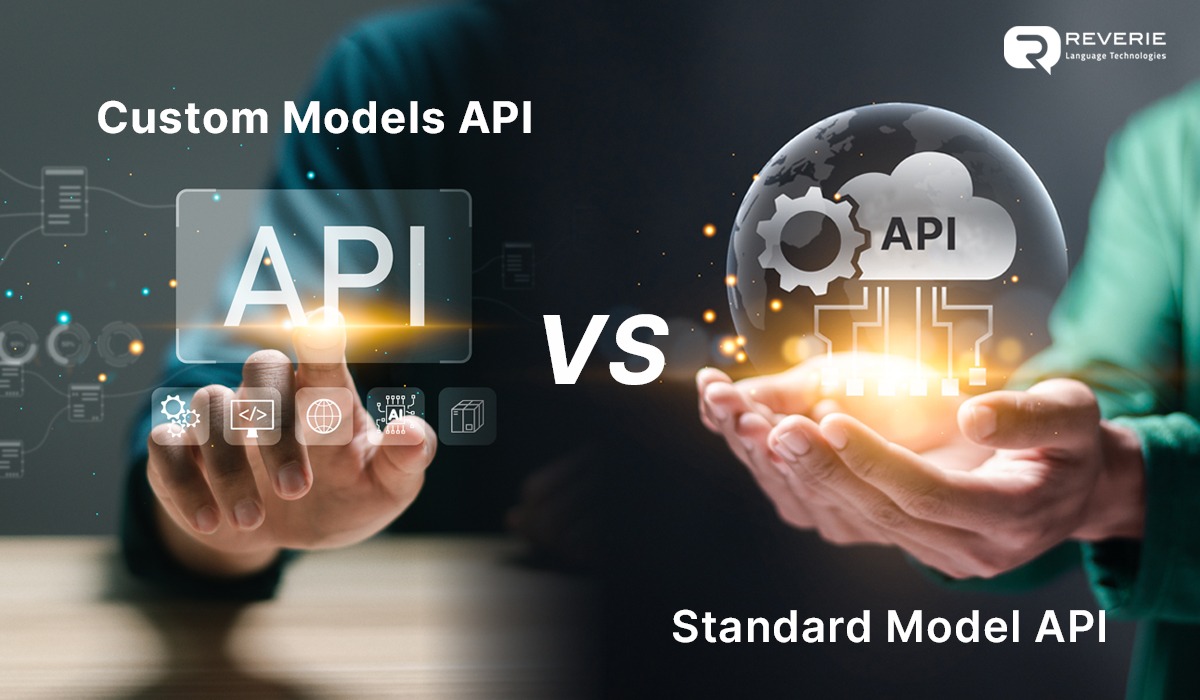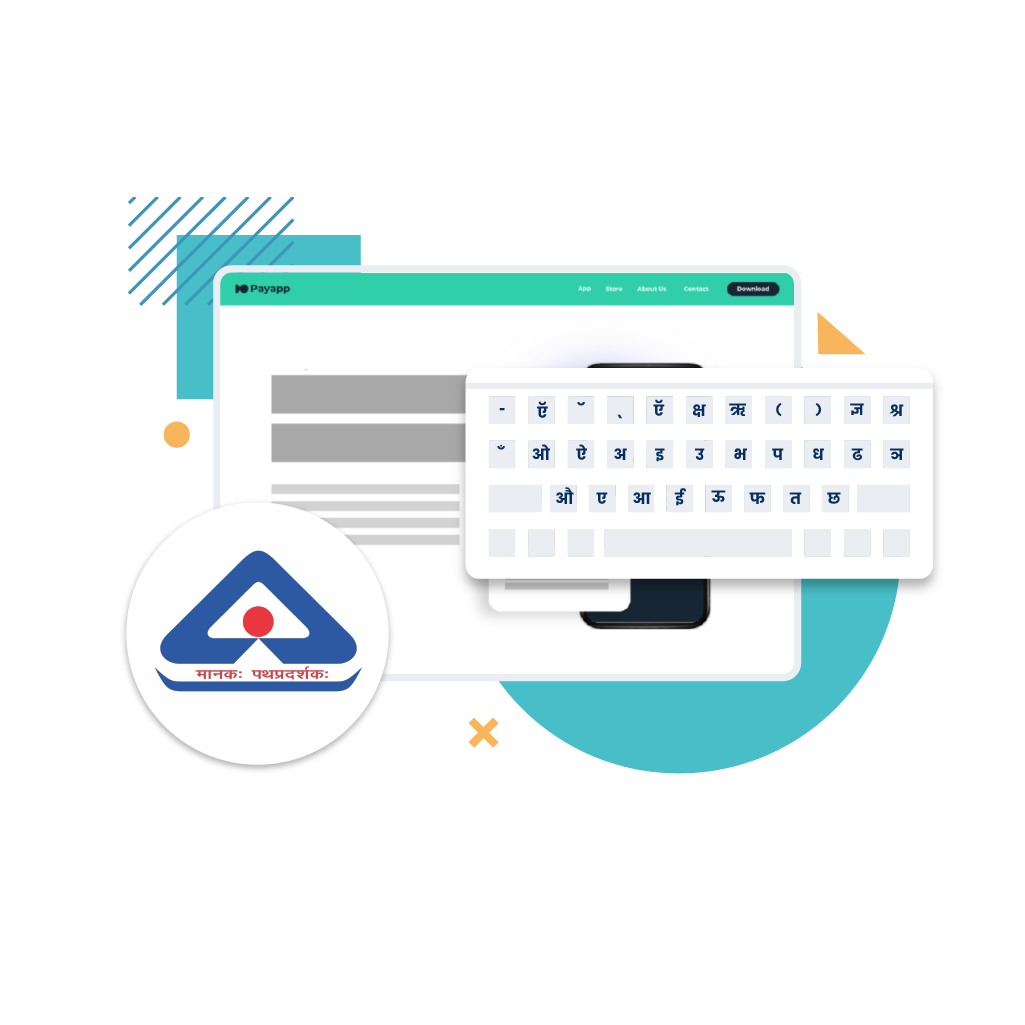The right language technology solution can totally transform your customer communication strategy and hence it’s one of the most important business decisions you will ever make. The accuracy and efficiency of language technology solutions can have a direct impact on your customer interactions and business outcomes.
Even after you choose the solution provider, there’s still another decision to be made – whether to choose a Standard Model API or a Custom Model API. This choice is not just about preference, but about meeting your specific business needs with accuracy. This is why the decision between a Custom Model API and a Standard Model API becomes even more critical.
In this article, we delve into the nuances of these two API (Application Program Interface) models.
Understanding Language Model APIs
APIs (Application Programming Interfaces) enable data transmission between software products and applications. They process data inputs and outputs efficiently by facilitating communication between various software components. However, not all APIs are the same, and it’s important to invest in an API that will meet your business requirements.
Standard Model APIs are widely adopted in the language industry. These APIs provide businesses with generic solutions and are quick to integrate. However, they may lack the personalised precision that some use cases require.
Custom Model APIs are designed specifically to cater to such unique requirements. It is a bespoke solution that incorporates specific datasets to enhance accuracy and functionality.
In a country like India, where language diversity is vast, businesses need to make an informed decision between these two models. This way, they can maximise their reach and effectiveness in the market. With that being said, let’s delve into the intricacies of these API models.
The Basics of Standard Model API
At its core, the Standard Model API operates on a broad dataset that comprises a general range of data inputs. This approach enables the API to cater to a wide range of language processing tasks. These APIs do not require any specific customisations and can be the go-to solution for many businesses.
Standard Model APIs provide businesses with a “one-size-fits-all” solution that is quick to deploy. They also have extensive compatibility across different platforms and applications.
How does the Standard Model API work?
The Standard Model API employs a comprehensive data-driven translation engine. The diverse array of data is fed to this engine, which it uses to interpret and translate text. This model has the ability to process extensive information, making it a versatile solution. In short, businesses that are looking for a solution for general translation tasks across multiple domains can opt for the Standard Model API.
One of the prime examples of the Standard Model APIs is Reveri’s Translation API, which translates text accurately and fluently. Similarly, other APIs by Reverie, including Transliteration API, Text-to-Speech API, and Speech-to-Text API, are also examples of the Standard Model API.
The standard Model APIs reduce the complexity and time involved in deploying language solutions. Now let’s move forward and get a better understanding of the Custom Models APIs.
Custom Model API: Tailoring Precision
While the Standard Model API is a versatile solution, Custom Model APIs represent the pinnacle of personalised language solutions. They offer unparalleled accuracy by tailoring the API to the specific needs of the business.
If your business operates in specialised fields or has a unique set of requirements, a Custom Model API can be a better choice than the Standard Model API.
Enhanced accuracy with bespoke solutions
The biggest advantage of the Custom Model APIs is their ability to incorporate specific datasets provided by the client. These datasets are integrated with the existing data to produce results that are significantly more precise and relevant. That means you can fine-tune pre-trained language models by providing the datasets that you want the model to use.
Businesses often choose Custom Model APIs when their existing APIs fall short. With custom integrations, language solution providers, like Reverie, can create a customised model, specific to your needs.
A collaborative process to building a Custom Model
The development of the Custom Model API requires a detailed, client-focused strategy. It starts with an in-depth analysis of the client’s needs and requirements. After that, the client’s unique datasets are integrated with Reverie’s robust language processing framework. This collaborative process ensures that the API is finely tuned and delivers optimal performance.
Choosing Between Standard and Custom Models
There are a few major factors that a business must consider when deciding between a Standard Model and a Custom Model API. These include:
Accuracy: The Primary Deciding Factor
There are many businesses that rely heavily on precise language accuracy, even the slightest error could be disastrous. Such businesses should opt for a Custom Model API, as it offers tailored language processing solutions. It ensures the reliability and precision required.
Additional Considerations in Choosing an API Model
While accuracy is the primary deciding factor, there are several other factors that you should consider before making the final decision. These include:
Feature integration: Suppose, a business requires specific features and functionalities that are not supported by Standard Models. In this case, Custom Models can be designed to incorporate those unique features to cater to the business needs.
Processing speed: The efficiency of an API model can have a major impact on operational productivity. While Standard Model APIs offer sufficient speed for most use cases and general purposes. However, if you require exceptionally rapid processing, such as real-time communication, you should consider Custom Models. These models can be optimised to operate at higher speeds by leveraging advanced computing resources like GPUs.
Business-specific requirements: Each company has unique operational., security, and compliance requirements. Standard Models can sometimes lack in addressing all of these requirements fully. But with Custom Models, businesses can get tailored solutions that adhere to their specific regulatory standards or security protocols.
It is also important to consider the cost, development time, and resource allocation required for Custom Models.
Reverie's Unique Selling Proposition
Reverie stands out in the language technology landscape with its superior Custom Model APIs, underpinned by the following strengths:
Expertise in Custom Model Creation
- Reverie specialises in developing highly accurate Custom Model APIs.
- Reverie tailors solutions specifically to the unique linguistic needs of each client, enhancing their communication infrastructure.
Comprehensive Customer Support
- Reverie provides businesses with a robust support system that includes technical and engineering assistance.
- We ensure continuous interaction with clients to refine and optimise solutions as per evolving needs.
Flexibility in Customisation
- Reverie provides extensive customization options that allow for corrections and further optimizations of the APIs.
- We adapt solutions dynamically to meet specific client requirements and scenarios.
Commitment to Data Privacy and Security
- We uphold the highest standards of data privacy and security, protecting client information at all stages of API implementation and use.
Insightful Performance Reports
- Reverie provides clients with valuable insights through detailed latency and benchmark reports.
- These reports offer a transparent view of performance, aiding clients in making informed decisions about their technology investments.
Reverie’s dedication to going above and beyond in technology development and client service ensures it offers transformative business tools.
Conclusion: Choosing the Right Model
When choosing an API model, it is crucial to ensure that it aligns with your business goals and operational requirements. You must assess your immediate needs against long-term growth plans. If your business has broad, general needs with less specificity, a Standard Model API can work well for your business. It also offers quick deployment and ease of integration. However, if your business has unique demands and needs higher precision and customisation, you should consider a Custom Model API.
Reverie’s expertise in both models ensures that your business is getting a robust and reliable model. You also receive unmatched support and technology tailored to meet your needs. To learn more about Reverie and get in touch with an expert from Reverie or book your free demo, click here!


